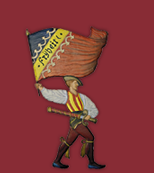
Showcases referring to the Peasants' Wars
Hohenlupfen castle and Stühlingen town, Stühlingen county in 1524/1525 (Diorama 3)
The peasants´ upheaval began on 23 June 1524 in Stühlingen county when armed peasants gathered in front of Hohenlupfen castle. Later on they marched to Waldshut under the command of Hans Müller of Bulgenbach. There they associated with the rebellious citizenship that was on inimical terms with its Austrian government because of its introduction of the evangelical denomination.The main reason for the Peasants´ War 1524/1525 in southwest Germany was the increasing deprivation of the peasants by their noble landowners during the 15 century. The noblemen at the same time increased the tax burden of their subjects and cut down their rural self-government. The growing exploitation of the peasants had already caused several upheavals of the “common man”: the so called “Bundschuh” in 1493, 1502, 1523 (in the village Lehen near Freiburg), a conspiration of peasants to prepare for revolt to reestablish the “old rights”.On 23 June 1524 the peasants of Stühlingen county (Grafschaft) gathered in front of Hohenlupfen castle where their speaker Michael Haim demanded to negotiate with the lord´s deputy (Landvogt) about restoring their traditional rights. At first the deputy was able to appease the peasants, but soon there occurred upheavals in other villages. In trying to get the upheaval under control count Sigismund II. of Stühlingen (Landgraf) offered negotiations to the peasants. They took place in Tiengen during August where a delegation of 22 peasants met with the representatives of the Austrian government and again during September in Schaffhausen on “neutral grounds” with Swiss confederates as mediators. Meanwhile the commander Hans Müller enlisted an army of violent peasants which was roaming about to recruit supporters. At the end of July a contingent of 600 peasants moved to Waldshut to fraternize with the rebellious citizenship. Having introduced the evangelical denomination (Reformation) Waldshut was anxious about the catholic government to intervene and thus welcomed the support of the peasants. In view of the growing support for Hans Müller´s radical approach now the peasants refused to accept the contract which had been agreed upon in Schaffhausen. So within a few weeks a local revolt spread into an area conflagration. Already on 2 Oktober occurred the upheaval of the Hegau peasants during the annual fair (Kirchweih) of Hilzingen. In the fall of the year 1524 Hans Müller´s army moved around Black Forest and enlisted successfully new supporters.


